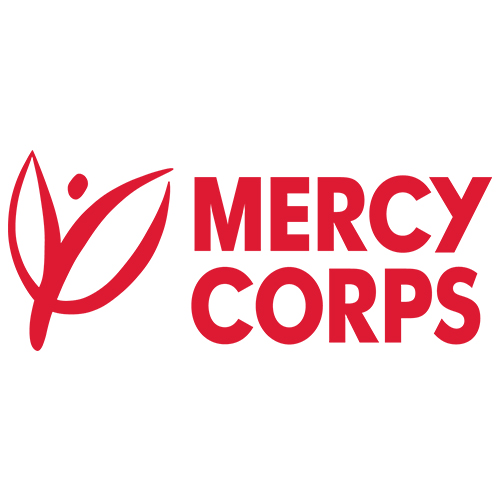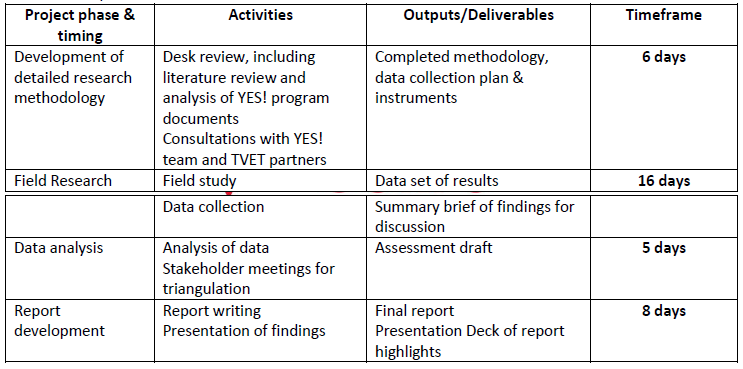(Offre en anglais) Mercy Corps lance un appel à consultation “Impact Assessment of Entrepreneurial Clubs” Retour vers les opportunités
Mercy Corps
Lance Offre d'emploiÉchéance
04 Novembre 2017 Il y a 8 ans
Critères d'éligibilité
Cliquez ici pour parcourir les critères d'éligibilitéPartager l'opportunité sur
Détails de l'opportunité
Domaines concernées par cette opportunité: Economie social et solidaire et 1 autre(s) domaines
Project/Consultancy Title: Impact Assessment of Entrepreneurial Clubs
Project Location(s): Sample of YES! Hubs in Tunisia
Duration of Assignment: 35 working days, starting November 2017
BACKGROUND
Mercy Corps is powered by the belief that a better world is possible. Across the more than 40 countries in which we operate, we’re working to address root causes of poverty head on, and helping those caught in crisis not only meet their immediate needs, but build a brighter future. In taking on these challenges, Mercy Corps does not act alone nor are we satisfied with business as usual. In our work, we strive to innovate for greater impact – often through increased take-up of technology and investment in market-driven models. In our work, we see technology as an enabler to improve scale, access, efficiency, engagement, and effectiveness in our global work.
Youth Empowered for Success (YES!) is a partnership with The Coca-Cola Africa Foundation (TCCAF) and Harambee which seeks to enhance employment for 25,000 young people in six African countries by 2018, and 500,000 by 2022. Mercy Corps is the lead implementer in Kenya, Uganda, Liberia, Nigeria, and Tunisia. The program has three work streams:
- Core YES! Model: Localizing the YES! model in 6 countries to improve the employment and entrepreneurship of 11,000 youth.
- Innovation and Digital: Driving innovation in youth employment in Africa through business solutions including digital tools, reaching 14,000 youth.
- Thought leadership: Research and learning on youth economic empowerment in Africa, building an evidence base enabling partnerships to scale to reach 500,000
PROJECT DESCRIPTION:
YES! began operating in Tunisia in 2015. Working through the Government’s agency responsible for vocational training, the Agence Tunisienne de la Formation Professionnelle (ATFP), we have established Clubs Entreprendres in 42 of ATFP’s 135 technical vocational educational training (TVET) schools as well as eight Hubs through the Higher Institute for Scientific and Technology (ISET), and two with community-based organization. In total, YES! has 44 active Clubs Entreprendres.
These clubs seek to provide an out-of-classroom forum for youth to develop the soft skills that employers and the labour market demand. Entrepreneurship Clubs are about more than just setting up a business; they are based on evolved concepts of entrepreneurship about building people’s ability to turn ideas into action. There is increasing global awareness that this competency is critical in the modern labor market, and there is strong evidence that entrepreneurship training builds a number of transferable skills relevant to the labor market. Despite this, the OECD found that only 41% of Technical and Vocational Educational Training (TVET) institutions in Tunisia offered entrepreneurship training, mostly as part of formal courses, but in some cases as an extracurricular activity. While there is strong enthusiasm for enhanced integration of entrepreneurship training from within the government, there have been few scaled programs to do this across the country.
YES! seeks to improve and enhance youth livelihoods, and by working through the Government of Tunisia, amplify the scale and sustainability of our approach. So far, YES! has engaged over 4,400 youth and nearly 2,500 youth have received training through the program. However, we have only carried out one small qualitative study to determine intermediate outcomes of our Clubs Entreprendres strategy.
OBJECTIVES OF THE CONSULTANCY:
YES! is committed to effectively tracking its impact and developing bold insights to contribute meaningfully to the global conversation on youth economic empowerment by learning from what we do, and putting that learning back into practice. This particular project is an exciting opportunity for YES! to continue building its evidence base on what works and what does not in our strategy to empower young people in Tunisia. Broadly, our learning agenda for this assessment is as follows:
A. ACCESS:
- Who is accessing YES! Clubs Entreprendres? What are the demographics of members?
- What is the frequency of participation in YES! activities, including training, mentor meetings, and business visits? What events are preferred by members?
- What is the completion rate of YES! curriculum modules?
- What are the barriers/constraints to youth accessing the Clubs in general, different activities, and YES! training?
- How do sex, age, education, poverty level, employment status influence all of the above?
B. LEARNING & LIVEHOOD OUTCOMES:
- To what extent do participating youth demonstrate learning as measured through a change in knowledge, attitudes and practices as linked to Club activities?
- Is participation in Club activities likely to impact on livelihoods according to YES!’s four domains of change: skills, diversity, income and savings, and meaningfulness? That is, are the Clubs developing entrepreneurial actors, supporting the development/expansion of youth businesses, and diversifying participating youth’s livelihood portfolios?
- Which content or activities proved more effective in facilitating desired learning and livelihood outcomes?
C. ORGANIZATIONAL CAPACITY OF PARTNERS:
- Are YES! partner organizations achieving set results and meeting standards?
- Are YES! partner organizations delivering services more effectively?
- Do YES! partners have an actionable sustainability plan?
D. RECOMMENDATIONS:
The findings from this assessment will inform implementation by YES! partners in Tunisia, and inform paths to scale for the program.
RESEARCH METHODOLOGY:
The consultant will develop their own approach, in collaboration with the YES! Results, Learning & Research Coordinator. S/he will employ research methodologies with sufficient rigor to generate actionable answers to the research questions within the resources and timeframe available for this effort. S/he will have access to the database of monitoring data from YES! implementation so far, but much of the research will require on-the-ground observation, interviews, surveys, focus groups, participatory activities and more. The assessment should actively and respectfully engage primary stakeholders throughout the research cycle. This could involve engaging further enumerators.
Sample research methods include:
- Determining Club access patterns:
- Quantitative: Analysis of YES! database; targeted surveys
- Qualitative: Field study; structured interviews; Focus group discussions
- Determining learning and livelihood outcomes:
- Quantitative: Performance on site quizzes and tests; Targeted surveys
- Qualitative: Desk review; structured interviews; Focus group discussions; Field study; ‘Most Significant Change’; photo voice etc.
- Determining changes in organizational capacity of partners:
- Quantitative: Targeted surveys
- Qualitative: Desk review; structured interviews; Focus group discussions; Field study
DELIVRABLES:
The consultant will finalize the scope and purpose of the research; design and test data collection tools; identify and acquire necessary secondary data sources; carry out the collection of data; analyze data; and draft actionable findings and interpretations. The consultant will have responsibility for ensuring quality and rigor of the research findings. The consultant will engage in the following activities and others as required.
Suggested Time frame:
- The consultancy will take place over 35 days starting November 2017.
- The Consultant will report to:
- The consultant will report directly to YES! Results, Learning and Research Coordinator.
- The Consultant will work closely with:
- The YES! Tunisia Program Manager, YES! Program Director, YES! staff in Tunisia as well as TVET partners in Tunisia.
Critères d'éligibilité
- Advanced university degree in education, programme management or other development related fields
- Experience in applying qualitative and quantitative evaluation methods, with a minimum of 4 years, demonstrating a strong record in designing and conducting/leading evaluations, particularly in the area of education
- Experience carrying out participatory assessments in Northern Africa; experience evaluating entrepreneurship is a plus,
- Excellent language skills in English (oral communication and report writing)
- knowledge of French and/or Arabic required
L'opportunité a expiré
Cette opportunité n'est malheureusement plus disponible sur Jamaity. Visitez régulièrement la rubrique opportunités pour ne plus en rater.
Suivez Jamaity sur LinkedIn
Obtenez Jamaity Mobile dès maintenant

Offre d'emploi Publié sur Jamaity le 25 octobre 2017
Découvrez encore plus d'opportunités sur Jamaity en cliquant sur ce lien.


